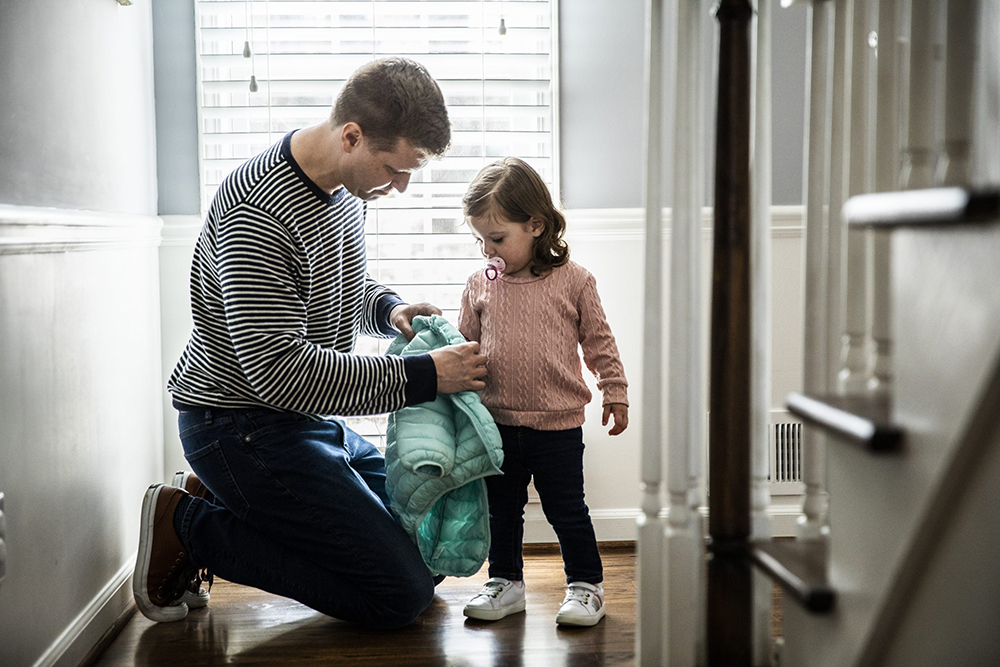
不久之前,在影視作品中經(jīng)??吹桨职謧冏鳛楸渴直磕_的次要看護(hù)人,,不知道如何給孩子扎頭發(fā)或換尿布。但一項(xiàng)最新研究顯示,,“無(wú)用的爸爸”這種刻板印象與現(xiàn)實(shí)相去甚遠(yuǎn),。
事實(shí)上,皮尤研究中心(Pew Research Center)的最新分析發(fā)現(xiàn),,目前爸爸們?cè)谌毤议L(zhǎng)中的占比達(dá)到18%,。
過(guò)去30年,全職爸爸的數(shù)量增長(zhǎng)了近一倍,,經(jīng)濟(jì)下滑促進(jìn)了這種趨勢(shì),。
在千禧年之交,全職爸爸在所有爸爸中所占的比例只有5%,。
2008年左右,,這一比例提高到9%。但隨著經(jīng)濟(jì)復(fù)蘇,,擔(dān)任主要看護(hù)人角色的爸爸?jǐn)?shù)量逐步減少,,直到后來(lái)疫情爆發(fā),。
在英國(guó),,研究顯示,,在疫情期間,全職爸爸的數(shù)量增加了三分之一,,這凸顯出一種全球文化轉(zhuǎn)變,。許多男性不得不在遠(yuǎn)程辦公的同時(shí),兼顧照顧子女的責(zé)任,,這是史上第一次出現(xiàn)這種現(xiàn)象,。
爸爸們?yōu)槭裁淳蛹?/strong>
全職家長(zhǎng)依舊以女性為主,皮尤研究中心調(diào)查發(fā)現(xiàn),,約80%的女性居家的唯一目的是照顧家人,,但全職爸爸不太可能因?yàn)橥瑯拥脑螂x開(kāi)勞動(dòng)力隊(duì)伍。
超過(guò)三分之一的爸爸們居家的原因是因病或殘疾無(wú)法工作,,有13%已經(jīng)退休,,有13%表示他們找不到工作,還有8%將回到校園,。
此外,,有23%的男性表示居家的目的是為了處理家務(wù)或照顧家人。
但與30年前相比,,這依舊是一個(gè)巨大的轉(zhuǎn)變,。30年前,56%的爸爸們因?yàn)榧膊』驓埣簿蛹?,只?%是為了照顧子女,。
數(shù)據(jù)顯示,越來(lái)越多爸爸們優(yōu)先選擇照顧子女而不是掙錢養(yǎng)家,,他們并非在受傷或者在經(jīng)濟(jì)衰退期間失業(yè)后才不得不承擔(dān)起這份責(zé)任,。
這份全職爸爸分析報(bào)告的作者、皮尤高級(jí)研究員理查德·福萊對(duì)Insider表示:“全國(guó)的爸爸們當(dāng)中出現(xiàn)了一種轉(zhuǎn)變,。這能否稱得上巨大轉(zhuǎn)變,?不能。但有一些證據(jù)似乎可以證明,,性別規(guī)范的變化使全職爸爸?jǐn)?shù)量增加,。”
此外,,全職爸爸與職場(chǎng)爸爸相比,,受教育程度和經(jīng)濟(jì)地位更低。但過(guò)去三十年,,有學(xué)士學(xué)位的全職爸爸的比例不斷提高,。
福萊表示:“如果你受過(guò)更好的教育,,你成為全職爸爸的可能性較低?!?/p>
由于兒童護(hù)理成本通常令無(wú)數(shù)家庭難以承受,,因此收入較低的家長(zhǎng)居家照顧子女在經(jīng)濟(jì)上是可行的。隨著越來(lái)越多女性接受高等教育并進(jìn)入職場(chǎng),,爸爸們更有可能成為收入更低的一方,,他們可能會(huì)離開(kāi)職場(chǎng),承擔(dān)起照顧子女的責(zé)任,。(財(cái)富中文網(wǎng))
翻譯:劉進(jìn)龍
審校:汪皓
不久之前,在影視作品中經(jīng)??吹桨职謧冏鳛楸渴直磕_的次要看護(hù)人,,不知道如何給孩子扎頭發(fā)或換尿布。但一項(xiàng)最新研究顯示,,“無(wú)用的爸爸”這種刻板印象與現(xiàn)實(shí)相去甚遠(yuǎn),。
事實(shí)上,皮尤研究中心(Pew Research Center)的最新分析發(fā)現(xiàn),,目前爸爸們?cè)谌毤议L(zhǎng)中的占比達(dá)到18%,。
過(guò)去30年,全職爸爸的數(shù)量增長(zhǎng)了近一倍,,經(jīng)濟(jì)下滑促進(jìn)了這種趨勢(shì),。
在千禧年之交,全職爸爸在所有爸爸中所占的比例只有5%,。
2008年左右,,這一比例提高到9%。但隨著經(jīng)濟(jì)復(fù)蘇,,擔(dān)任主要看護(hù)人角色的爸爸?jǐn)?shù)量逐步減少,,直到后來(lái)疫情爆發(fā)。
在英國(guó),,研究顯示,,在疫情期間,全職爸爸的數(shù)量增加了三分之一,,這凸顯出一種全球文化轉(zhuǎn)變,。許多男性不得不在遠(yuǎn)程辦公的同時(shí),兼顧照顧子女的責(zé)任,,這是史上第一次出現(xiàn)這種現(xiàn)象,。
爸爸們?yōu)槭裁淳蛹?/strong>
全職家長(zhǎng)依舊以女性為主,皮尤研究中心調(diào)查發(fā)現(xiàn),,約80%的女性居家的唯一目的是照顧家人,,但全職爸爸不太可能因?yàn)橥瑯拥脑螂x開(kāi)勞動(dòng)力隊(duì)伍,。
超過(guò)三分之一的爸爸們居家的原因是因病或殘疾無(wú)法工作,有13%已經(jīng)退休,,有13%表示他們找不到工作,,還有8%將回到校園。
此外,,有23%的男性表示居家的目的是為了處理家務(wù)或照顧家人,。
但與30年前相比,這依舊是一個(gè)巨大的轉(zhuǎn)變,。30年前,56%的爸爸們因?yàn)榧膊』驓埣簿蛹?,只?%是為了照顧子女,。
數(shù)據(jù)顯示,越來(lái)越多爸爸們優(yōu)先選擇照顧子女而不是掙錢養(yǎng)家,,他們并非在受傷或者在經(jīng)濟(jì)衰退期間失業(yè)后才不得不承擔(dān)起這份責(zé)任,。
這份全職爸爸分析報(bào)告的作者、皮尤高級(jí)研究員理查德·福萊對(duì)Insider表示:“全國(guó)的爸爸們當(dāng)中出現(xiàn)了一種轉(zhuǎn)變,。這能否稱得上巨大轉(zhuǎn)變,?不能。但有一些證據(jù)似乎可以證明,,性別規(guī)范的變化使全職爸爸?jǐn)?shù)量增加,。”
此外,,全職爸爸與職場(chǎng)爸爸相比,,受教育程度和經(jīng)濟(jì)地位更低。但過(guò)去三十年,,有學(xué)士學(xué)位的全職爸爸的比例不斷提高,。
福萊表示:“如果你受過(guò)更好的教育,你成為全職爸爸的可能性較低,?!?/p>
由于兒童護(hù)理成本通常令無(wú)數(shù)家庭難以承受,因此收入較低的家長(zhǎng)居家照顧子女在經(jīng)濟(jì)上是可行的,。隨著越來(lái)越多女性接受高等教育并進(jìn)入職場(chǎng),,爸爸們更有可能成為收入更低的一方,他們可能會(huì)離開(kāi)職場(chǎng),,承擔(dān)起照顧子女的責(zé)任,。(財(cái)富中文網(wǎng))
翻譯:劉進(jìn)龍
審校:汪皓
Not too long ago, dads onscreen took on the starring role as the fumbling secondary caregiver who didn’t know how to braid their child’s hair or change a nappy, but according to new research, the “useless dads” stereotype is very wide off the mark.
In fact, dads now make up 18% of stay-at-home parents, according to a new Pew Research Center analysis.
The number of stay-at-home fathers has nearly doubled over the past 30 years, with economic downturns fuelling the trend.
Just 5% of fathers were stay-at-home dads at the turn of the millennium.
Around 2008, this percentage surged to 9%, yet with a strengthening economy, the share of fathers in the primary caregiver role gradually diminished—until the pandemic hit.
In the U.K. as well, research indicates that stay-at-home dads surged by a third during the pandemic, highlighting a global cultural shift as many men were compelled, for the first time, to juggle childcare duties while working remotely.
Why dads are staying at home
While mothers still make up the lion’s share of stay-at-home parents, with Pew Research Center finding almost 80% of women are staying at home for the sole purpose of taking care of their household, stay-at-home dads are less likely to be dropping out of the workforce for the same reason.
Over one-third are not working due to illness or disability, some 13% are retired, 13% said they could not find work, and 8% are going to school.
Meanwhile, 23% cited staying at home to care for the home or family.
Still, this represents a big shift from 30 years ago when 56% of fathers were staying at home due to an illness or disability and merely 4% were doing so to look after their kids.
The data suggests that dads are increasingly choosing parenting over breadwinning, instead of taking on the role by default after being injured or let go from their job during a recession.
“There is a bit of a shift among the nation’s fathers,” Richard Fry, a senior researcher at Pew who authored the analysis on stay-at-home dads, told Insider. “Is it huge? No. But there seems to be some evidence that changing gender norms are contributing to the rise in stay-at-home dads.”
Moreover, stay-at-home fathers generally have lower education and economic status compared to their employed counterparts. However, the proportion of stay-at-home dads with a bachelor’s degree has increased over the past three decades.
“If you’re a better-educated dad, you’re less likely to be a stay-at-home father,” Fry said.
With childcare expenses often out of reach for numerous families, it becomes economically viable for the lower-earning parent to stay home. As more women pursue higher education and enter the workforce, it’s becoming more probable for fathers to step in as the lower-earning parent who might leave work for child-rearing.






